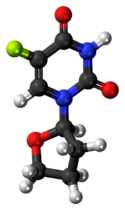Chemistry:Tegafur
 | |
 | |
| Clinical data | |
|---|---|
| Other names | 5-fluoro-1-(oxolan-2-yl)pyrimidine-2,4-dione |
| AHFS/Drugs.com | International Drug Names |
| License data | |
| Pregnancy category |
|
| Routes of administration | Oral |
| ATC code | |
| Legal status | |
| Legal status | |
| Pharmacokinetic data | |
| Elimination half-life | 3.9-11 hours |
| Identifiers | |
| |
| CAS Number | |
| PubChem CID | |
| DrugBank | |
| ChemSpider | |
| UNII | |
| KEGG | |
| ChEMBL | |
| Chemical and physical data | |
| Formula | C8H9FN2O3 |
| Molar mass | 200.169 g·mol−1 |
| 3D model (JSmol) | |
| |
| |
| | |
Tegafur is a chemotherapeutic prodrug of 5-fluorouracil (5-FU) used in the treatment of cancers. It is a component of the combination drug tegafur/uracil. When metabolised, it becomes 5-FU.[1]
It was patented in 1967 and approved for medical use in 1972.[2]
Medical uses
As a prodrug to 5-FU it is used in the treatment of the following cancers:[3]
- Stomach (when combined with gimeracil and oteracil)
- Breast (with uracil)
- Gallbladder
- Lung (specifically adenocarcinoma, typically with uracil)
- Colorectal (usually when combined with gimeracil and oteracil)
- Head and neck
- Liver (with uracil)[4]
- Pancreatic
It is often given in combination with drugs that alter its bioavailability and toxicity such as gimeracil, oteracil or uracil.[3] These agents achieve this by inhibiting the enzyme dihydropyrimidine dehydrogenase (uracil/gimeracil) or orotate phosphoribosyltransferase (oteracil).[3]
Adverse effects
The major side effects of tegafur are similar to fluorouracil and include myelosuppression, central neurotoxicity and gastrointestinal toxicity (especially diarrhoea).[3] Gastrointestinal toxicity is the dose-limiting side effect of tegafur.[3] Central neurotoxicity is more common with tegafur than with fluorouracil.[3]
Pharmacogenetics
The dihydropyrimidine dehydrogenase (DPD) enzyme is responsible for the detoxifying metabolism of fluoropyrimidines, a class of drugs that includes 5-fluorouracil, capecitabine, and tegafur.[5] Genetic variations within the DPD gene (DPYD) can lead to reduced or absent DPD activity, and individuals who are heterozygous or homozygous for these variations may have partial or complete DPD deficiency; an estimated 0.2% of individuals have complete DPD deficiency.[5][6] Those with partial or complete DPD deficiency have a significantly increased risk of severe or even fatal drug toxicities when treated with fluoropyrimidines; examples of toxicities include myelosuppression, neurotoxicity and hand-foot syndrome.[5][6]
Mechanism of action
It is a prodrug to 5-FU, which is a thymidylate synthase inhibitor.[3]
Pharmacokinetics
It is metabolised to 5-FU by CYP2A6.[7][8]
Interactive pathway map
See also
- Tegafur/uracil
- Tegafur/gimeracil/oteracil
References
- ↑ "Metabolic activation of R,S-1-(tetrahydro-2-furanyl)-5-fluorouracil (ftorafur) to 5-fluorouracil by soluble enzymes". Cancer Research 43 (9): 4039–4044. September 1983. PMID 6409396.
- ↑ (in en) Analogue-based Drug Discovery. John Wiley & Sons. 2006. p. 511. ISBN 9783527607495. https://books.google.com/books?id=FjKfqkaKkAAC&pg=PA511.
- ↑ 3.0 3.1 3.2 3.3 3.4 3.5 3.6 "Martindale: The Complete Drug Reference". Pharmaceutical Press. 14 November 2011. http://www.medicinescomplete.com/mc/martindale/current/1866-m.htm.
- ↑ "Chemotherapy with enteric-coated tegafur/uracil for advanced hepatocellular carcinoma". World Journal of Gastroenterology 14 (18): 2797–2801. May 2008. doi:10.3748/wjg.14.2797. PMID 18473401.
- ↑ 5.0 5.1 5.2 "Clinical Pharmacogenetics Implementation Consortium guidelines for dihydropyrimidine dehydrogenase genotype and fluoropyrimidine dosing". Clinical Pharmacology and Therapeutics 94 (6): 640–645. December 2013. doi:10.1038/clpt.2013.172. PMID 23988873.
- ↑ 6.0 6.1 "Dihydropyrimidine dehydrogenase gene as a major predictor of severe 5-fluorouracil toxicity". Pharmacogenomics 12 (9): 1321–1336. September 2011. doi:10.2217/pgs.11.72. PMID 21919607.
- ↑ "Therapeutic usefulness of postoperative adjuvant chemotherapy with Tegafur-Uracil (UFT) in patients with breast cancer: focus on the results of clinical studies in Japan". The Oncologist 15 (1): 26–36. January 2010. doi:10.1634/theoncologist.2009-0255. PMID 20080863.
- ↑ "The European Medicines Agency review of Tegafur/Gimeracil/Oteracil (Teysuno™) for the treatment of advanced gastric cancer when given in combination with cisplatin: summary of the Scientific Assessment of the Committee for medicinal products for human use (CHMP)". The Oncologist 16 (10): 1451–1457. October 2011. doi:10.1634/theoncologist.2011-0224. PMID 21963999.
 |
